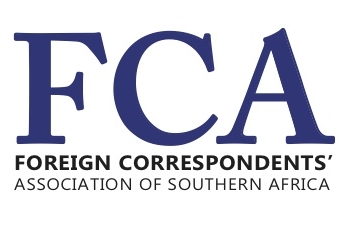© Nastasya Tay
The Foreign Correspondents' Association of Southern Africa is a non-profit organisation representing the interests of more than 280 journalists based in Southern Africa working for foreign media outlets. In addition to holding events with newsmakers throughout the year, the association acts as a watchdog for press freedom and strives to ensure that its members are able to work throughout the region without being intimidated or harassed.
Our history
The early days
The Foreign Correspondents’ Association of Southern Africa was formed in 1976 to represent foreign journalists working in the region. In its early days it fought to give foreign reporters free access to events in South Africa and ran a pool system to allow wider coverage of events restricted by the apartheid government. It also made representations to the authorities when journalists were expelled or threatened with expulsion. Despite this, the apartheid authorities did expel many foreign journalists. The archive covering FCA activities in the group’s first decade is kept at the Institute of Commonwealth Studies in London.
Violence and change
The period between the release from prison of Nelson Mandela in February 1990 and South Africa’s first free election in April, 1994, was filled with wonderful news stories and great danger for foreign reporters. Some were killed; many more injured. More than 70 were attacked in 1993 alone.
The danger came from government security forces as well as supporters of the ANC, IFP and right wing Afrikaaner groups. Some days reporters seemed threatened from all sides.
During this period, the FCA regularly complained to all these groups about threats, attacks, bannings, unfair tactics and obstructions that made difficult reporting tougher - and in some cases impossible.
As well as working to keep its members safe, the FCA fought against constantly changing government regulations on access to news events. In 1990, for instance, new unrest regulations were used to order reporters out of townships riven by conflict.
The FCA also sometimes had cause to sanction its own. In 1990 it suspended a member indefinitely after he had carried and used a gun in Kathlehong township.
But the early 1990s was not just a time of violence but one of great change. In 1990 and again in 1991 delegations from the FCA met with the African National Congress’ Department of Information and Publicity. At the first meeting the FCA expressed its members’ frustration with access to ANC officials. Eventually, the ANC had begun issuing press cards, was making spokespeople available around the clock, had begun training “press marshalls” to help rather than hinder reporters at large news events, and had made available a diary of engagements for Nelson Mandela. The party had become a government in waiting.
The new South Africa
In the post-apartheid era, the focus of the Foreign Correspondents’ Association has switched from trying to prevent its members being kicked out or killed to improving relations with South Africa ’s new government, setting up briefings with ministers and other newsmakers, and providing social contact between foreign reporters based here.
After the ANC first came to power in 1994, its relationship with the foreign media was good. Its leaders were regular speakers at the FCA annual dinner and at less formal Media Briefings. From the late 1990s on, though, the governing ANC has met less frequently with the FCA and the foreign press generally.
In the past decade the FCA has also intervened on behalf of journalists who have experienced difficulties obtaining visas, notably during the Abacha regime in Nigeria , in post-genocide Rwanda, where reporters had to submit fingerprints with visa applications, and, with less success, in Zimbabwe. It has also frequently spoken out against the lack of press freedoms in places like Zimbabwe.
The FCA today
In post-Apartheid South Africa, the FCA has concentrated on facilitating briefings with government ministers, newsmakers, socio-political and economic figures. These briefings have enabled members of the FCA to establish contacts at various levels of society.
The FCA continues to intervene on behalf of its members and the media fraternity in general in Southern Africa. There are ongoing engagements between the FCA and embassies to ease visa application procedures for journalists, which is some cases have yielded positive results.
Planning large, important events continues to be a challenge in many African countries including South Africa. The FCA has been tirelessly working with governments to improve communications on such events and offers advice and assistance whenever asked. In South Africa, the FCA keeps a constant line of contact open with the Government Communication and Information Systems (GCIS).
Opposition groups in parliament and non-governmental groups also turn to the FCA to host press conferences and to interact with the foreign press.
Using crews from the main media agencies, that contribute on a rotation basis; the FCA continues to run photo and video pools, as required when access is limited.

